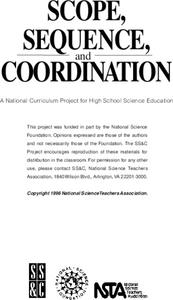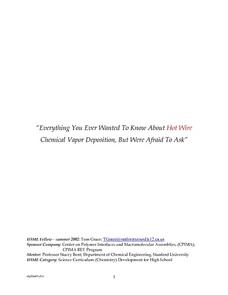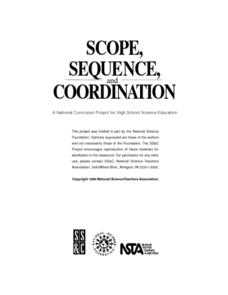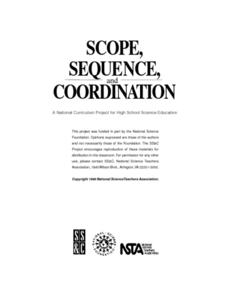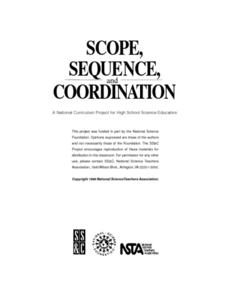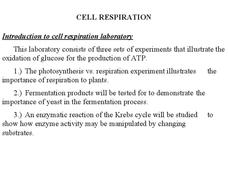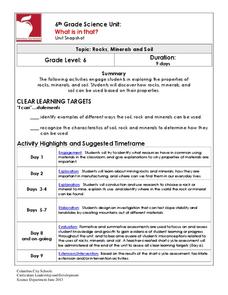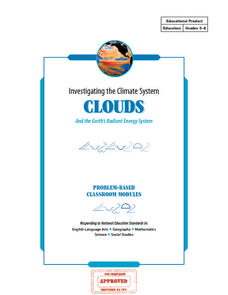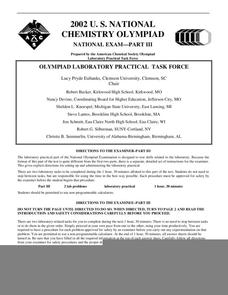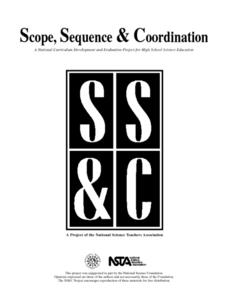Curated OER
Work and Energy
The first activity may not work for your class if you don't have access to an open area of 30 meters and two cars of different masses, but the remaining activities can be used in any physics course. They all involve the investigation of...
Baylor College
What Is a One Part Per Million Solution?
Water may appear to be crystal clear, but there could be dissolved substances present. Lab groups make a one-part-per-million of a food coloring solution to demonstrate this concept. As part of an outstanding unit about water, this...
Curated OER
A New Phase In Town
Middle schoolers explore heat energy and how it is used to change the phase of matter, and discover that temperature does not increase or decrease until the phase change is complete. This extremely well-written plan is packed with great...
Curated OER
Everything You Ever Wanted To Know About Hot Wire Chemical Vapor Deposition, But Were Afraid To Ask
To wrap up your year of general chemistry, have lab groups compete in a tot wire chemical vapor deposition (HWCVD) competition. With their foundation in chemical nomenclature, stoichiometry, and gas laws, each group completes several...
Curated OER
Density Studies of the Earth
Density comes to life as investigators place soda cans into containers of various liquids to find if they sink or float. They layer different density liquids, compare densities of different gases, and more. A total of six different...
Curated OER
Neurons and the Nervous System
The highlight of this series is activitiy #4. Anatomy pupils examine slides of three unknown cells. With the function of the nervous system in mind, they consider the structure of each and try to guess which one is part of that system....
Curated OER
Cell Structures and Their Functions
Life science learners investigate live cells. They examine wet mount slides of cyanobacteria and Elodea plants. They peer into the dynamic microscopic world of protists. Afterward, they construct a model of a cell, including rudimentary...
Curated OER
Heat and the Second Law of Thermodynamics
More than a week's worth of investigation is provided in this source. Physical science stars experiment to describe specific heat, conduction, convection, and radiation. They also discover the relationship between mechanical and thermal...
Curated OER
Heat, Temperature, and Transfer
Physical science scholars discover an array of heat sources. They experiment to connect radiation to heat. They begin to understand thermal equilibrium. Then, they test to see if mass affects the rate of temperature change. Choose a few,...
Curated OER
Electric Charge and Static Electricity
Begin with the classic static electricity demonstrations: the behavior of charged balloons and metal leaves of an electroscope. Then move on to test the electrical conductivity of various materials. Give physics pupils a charge with...
Curated OER
Acids, Bases, and Indicators
Chemistry or physical science fledglings get comfortable identifying acids and bases with a variety of pH indicators. They discover that different indicator solutions have different ranges, practice testing soil acidity, and use antacids...
Curated OER
Cell Size and Shape; Diffusion and Osmosis Processes
Use salmon eggs as a cell model for demonstrating the movement of water over concentration gradients. Junior scientists examine the same process microscopically with an onion cell. They use a thistle tube and a semipermeable membrane to...
Curated OER
Wave Phenomena and the Electromagnetic Spectrum
Science learners scrutinize shadow size and quality, and experiment with diffraction. They model superposition of electromagnetic waves, and experiment with interference. These activities are action-packed and challenging for your...
Curated OER
Analysis of the Concentration of Sodium Chloride in a Product
Students design an experiment to test for the concentration of chloride in products. In this analysis of chloride concentration lesson plan, students develop and conduct an experiment to find the amount of chloride ion in a substance of...
American Association for the Advancement of Science
Sensing the Invisible: The Herschel Experiment
Learners of light will construct a contraption in which light is passed through a prism and shone into a box. The temperatures at different points along the path and outside of the path of light. The intent is to imitate William...
Curated OER
Changing Planet: Black Carbon - a Dusty Situation
Introduce your young meteorologists to black carbon produced by the burning of fossil fuels by showing the video, "Changing Planet: Black Carbon." Viewers discover that deposition of this carbon on polar ice impacts the absorption of...
Curated OER
Cell respiration
Three lab guides are given here that detail experiments to illustrate the oxidation of glucose for the production of ATP. The first will compare photosynthesis and respiratio and show theimporatnce of both to plants. The next will show...
Columbus City Schools
What is in that?
Invite your class to dig in to an engaging journey into the world of mining! Here you'll find the tools to equip young miners with knowledge of soil, rocks, and minerals, as well as types of mining operations. To round things out, the...
Curated OER
Investigating the Climate System - Clouds
Here is a fabulous lesson on the Earth's radiant energy system. This amazing, 31-page document is chock-full of great activities, worksheets, lab sheets, quizzes, rubrics, and assessments. Learners model and explain cloud formation,...
Curated OER
2002 U.S. National Chemistry Olympiad National Exam - Part III
Two laboratory problems are put forth for chemistry students. They are to plan and carry out an experiment that will answer each of the questions. The first asks them to investigate a relationship between the surface area of a potato and...
Baylor College
Greenhouse S'Mores
Your class will agree that this is the best way to demonstrate the greenhouse effect: making solar s'mores! Using a clear plastic cups as mini atmospheres, lab groups compare how adding different materials affects the melting rate of...
University of Minnesota
Chemotaxis Using C. elegans
Have you ever wondered what roundworms are like? Or what they don't like? Explore the sensory preferences of C. elegans through this controlled chemotaxis experiment. Biology class members brainstorm what substances might attract—or...
Curated OER
Laws of Motion
Do you need some new ideas for teaching Newton's Laws of Motion? This series of activities will spring your curriculum to life! Choose from five activities to demonstrate or have your science stars perform. As a result, they...
Curated OER
Radioactivity, Time, and Age
Four activities demonstrate the chain reaction of nuclear fission to your physical science fans: falling dominoes, snapping mouse traps, throwing paper wads, and igniting a series of matches. They perform additional...
Other popular searches
- Science Lab Safety Rules
- Science Lab Safety
- Environment Science Labs
- Physical Science Lab Safety
- Forensic Science Lab
- Teaching Science Lab Safety
- Science Lab Equipment
- Science Lab Report
- Simple Science Lab Report
- Science Lab Safety Symbols
- Physical Science Labs
- Science Lab Report Templates
